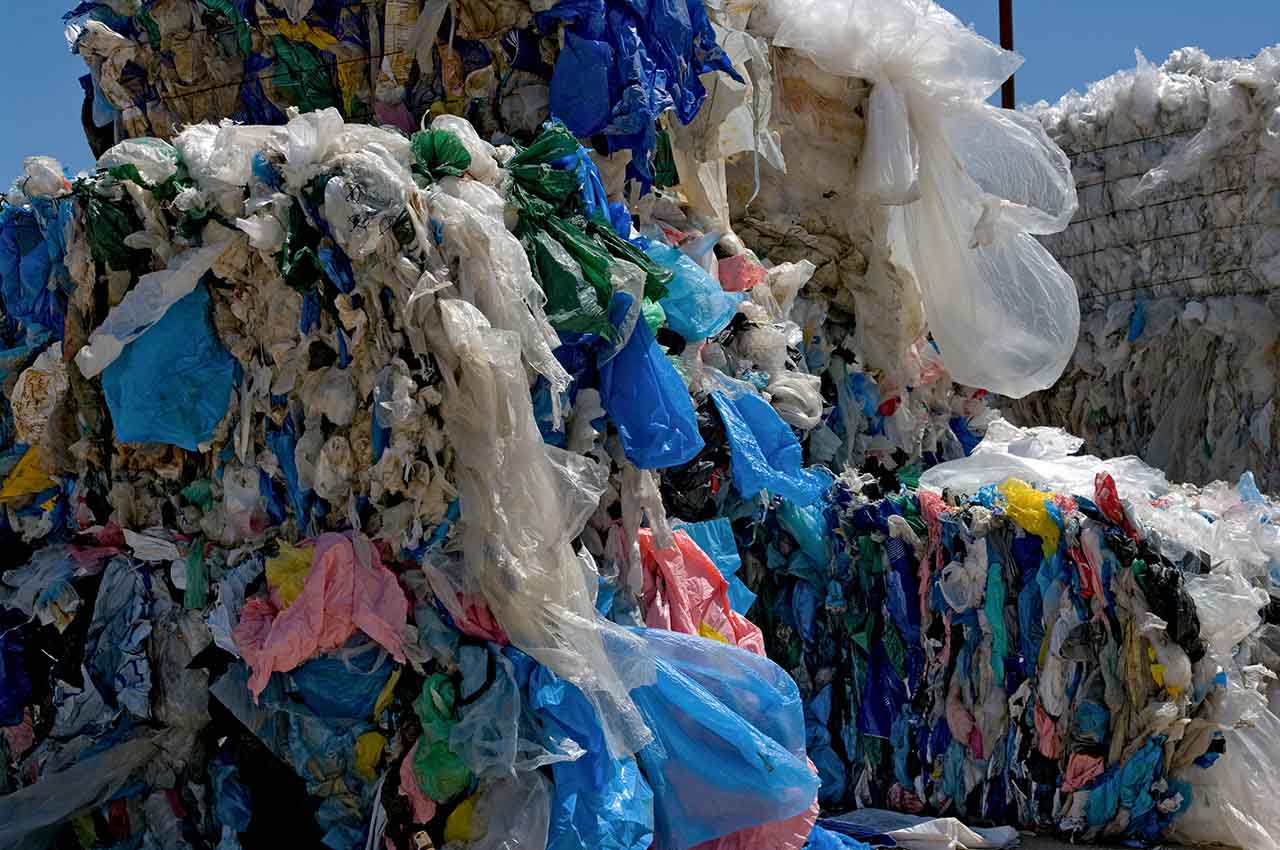
The Responsible Recycling Alliance is urging lawmakers to include reusable bags made from 40% post-consumer resin in the emerging extended producer responsibility for packaging program, SB 54. | Huguette Roe/Shutterstock
Seeking to quash a regulatory change that would remove over 100 million pounds of North American post-consumer resin demand per year, EFS-Plastics, Merlin Plastics and PreZero US have joined together to advocate for retaining recycled-content reusable plastic bags in California’s bag regulations.
The Responsible Recycling Alliance is calling for California lawmakers to abandon Senate Bill 1053 and its companion legislation, Assembly Bill 2236, which would expand the state’s bag ban to prohibit reusable bags made from 40% post-consumer resin.
In a statement, Roxanne Spiekerman, vice president of public affairs for PreZero US, said that by banning the reusable plastic film bags that contain PCR, the legislation would “force Californians to choose between two options, both of which carry with them negative environmental challenges.”
“The canvas and sewn poly-woven or non-woven polypropylene bags are not recyclable by any known method in the U.S., contain zero post-consumer content, and are typically imported from overseas,” Spiekerman said. “Similarly, paper bags consume more water and energy during production and recycling than reusable plastic film grocery bags, resulting in a bigger carbon footprint, they are not intended to be reused and consumers will have to pay more for them.”
The newly formed group doesn’t dispute that plastic bag recycling needs substantial improvement. But rather than banning the reusable plastic bags, it advocates for bringing them into the emerging extended producer responsibility for packaging program, SB 54. This would improve bag recycling in the state, maintain a significant market for post-consumer resin and do so with the financial responsibility falling to producers.
Spiekerman pointed out that “plastic film bag producers, as defined by SB 54, are the ones who will pay to fund the plastics collection infrastructure and the system wide improvements necessary to ensure that plastic film is recycled.”
EFS-Plastics previously estimated California’s PCR requirement for reusable plastic bags contributes to at least 100 million pounds per year of recycled resin demand, while the American Recyclable Plastic Bag Alliance industry group has estimated the demand is as high as 183 million pounds per year.
SB 1053 was approved by the state Senate in May and was referred to the state Assembly. On July 1, the Assembly Committee on Natural Resources voted to approve the bill with minor amendments. Next it goes to the committee on Appropriations before facing a floor vote.
Wider scrutiny on plastics in California
The proposed ban expansion comes as the California Attorney General’s office is scrutinizing plastic bag manufacturers, including producers of recycled-content bags, and two key plastics industry groups.
The bag producer scrutiny began in 2022, when Attorney General Rob Bonta asked Novolex, Revolution, Inteplast, Advance Polybag, Metro Polybag and Papier-Mettler to prove their bags are recyclable. Separately, Bonta in 2022 and 2023 issued subpoenas to the Plastics Industry Association and American Chemistry Council, respectively, seeking documents related to the organizations’ claims about recycling.
Bonta sought documents from the Plastics Industry Association “regarding the feasibility of recycling and the evolution of the organization’s campaign surrounding the recyclability of plastic,” his office stated in a recent release. And Bonta sought documents describing an ACC-funded study submitted to the Federal Trade Commission “in an attempt to modify the existing definition of recycled content and other definitions relevant to their campaign to expand chemical recycling,” his office announced.
On May 24, legal counsel for ACC filed a federal complaint against Bonta, alleging to the U.S. District Court for the District of Columbia that Bonta’s actions amounted to “an attempt by a state attorney general to use the powers of his office to punish a private party for presenting views to a federal agency that conflict with the policy positions that the state official supports.”
The complaint noted Bonta and ACC both testified to the FTC about updates to its Green Guides, on opposing sides of the chemical recycling debate, and it alleged his subpoenas were an effort to learn about ACC’s advocacy and “hinder its political engagement on the same policy issue that his office and ACC and its members disagree.”
On May 28, Bonta’s office announced neither organization had adequately responded to the subpoenas, and he petitioned Sacramento County Superior Court to order the organizations to respond.
“The continuous delay tactics are failing to comply with our subpoena,” Bonta said in the release. “Enough is enough: What are they trying to hide?”
Last week, legal counsel for ACC asked the court to quash Bonta’s request to the California court until the federal case is ruled on.
“Rather than rest on the persuasiveness of his advocacy, Bonta has chosen to wield the power he holds as California’s top prosecutor to harass and retaliate against those on the other side of a policy divide,” ACC’s legal counsel wrote.
A hearing on ACC’s motion to stop the California proceedings is set for Sept. 18. Meanwhile, the Plastics Industry Association has not yet responded to Bonta’s latest court action.
A version of this story appeared in Plastics Recycling Update on July 2.